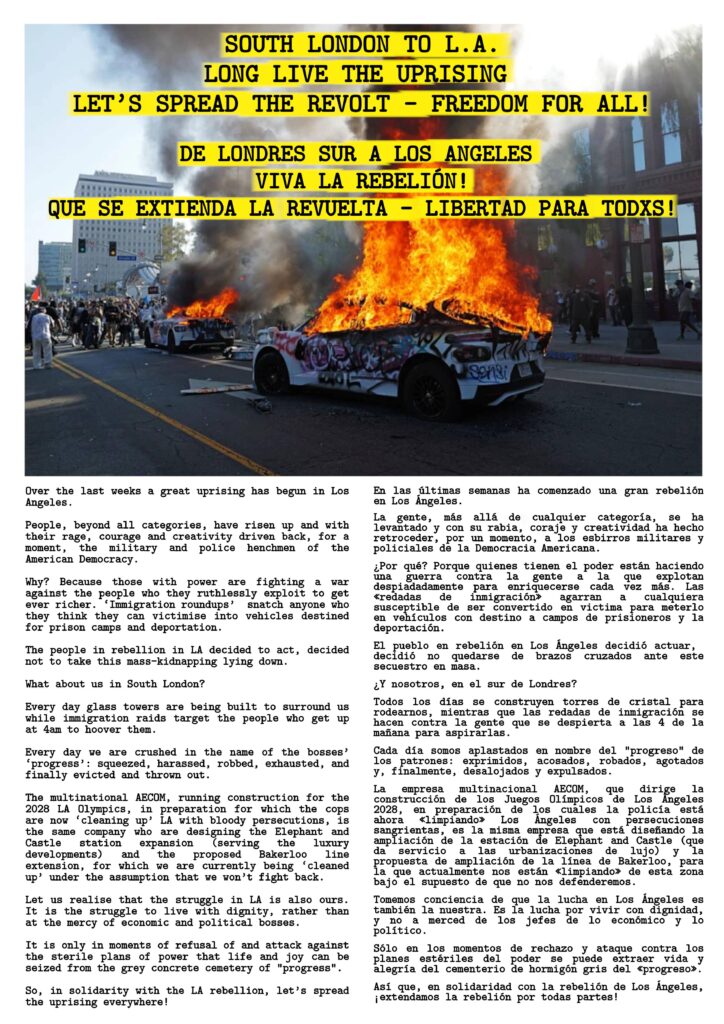
SOUTH LONDON TO L.A.
LONG LIVE THE UPRISING
LET’S SPREAD THE REVOLT – FREEDOM FOR ALL!
Over the last weeks a great uprising has begun in Los Angeles.
People, beyond all categories, have risen up and with their rage, courage and creativity driven back, for a moment, the military and police henchmen of the American Democracy.
Why? Because those with power are fighting a war against the people who they ruthlessly exploit to get ever richer. ‘Immigration roundups’ snatch anyone who they think they can victimise into vehicles destined for prison camps and deportation.
The people in rebellion in LA decided to act, decided not to take this mass-kidnapping lying down.
What about us in South London?
Every day glass towers are being built to surround us while immigration raids target the people who get up at 4am to hoover them.
Every day we are crushed in the name of the bosses’ ‘progress’: squeezed, harassed, robbed, exhausted, and finally evicted and thrown out.
The multinational AECOM, running construction for the 2028 LA Olympics, in preparation for which the cops are now ‘cleaning up’ LA with bloody persecutions, is the same company who are designing the Elephant and Castle station expansion (serving the luxury developments) and the proposed Bakerloo line extension, for which we are currently being ‘cleaned up’ under the assumption that we won’t fight back.
Let us realise that the struggle in LA is also ours. It is the struggle to live with dignity, rather than at the mercy of economic and political bosses.
It is only in moments of refusal of and attack against the sterile plans of power that life and joy can be seized from the grey concrete cemetery of “progress”.
So, in solidarity with the LA rebellion, let’s spread the uprising everywhere!
———————
ES:
DE LONDRES SUR A LOS ANGELES
VIVA LA REBELIÓN!
QUE SE EXTIENDA LA REVUELTA – LIBERTAD PARA TODXS!
En las últimas semanas ha comenzado una gran rebelión en Los Ángeles.
La gente, más allá de cualquier categoría, se ha levantado y con su rabia, coraje y creatividad ha hecho retroceder, por un momento, a los esbirros militares y policiales de la Democracia Americana.
¿Por qué? Porque quienes tienen el poder están haciendo una guerra contra la gente a la que explotan despiadadamente para enriquecerse cada vez más. Las «redadas de inmigración» agarran a cualquiera susceptible de ser convertido en victima para meterlo en vehículos con destino a campos de prisioneros y la deportación.
El pueblo en rebelión en Los Ángeles decidió actuar, decidió no quedarse de brazos cruzados ante este secuestro en masa.
¿Y nosotros, en el sur de Londres?
Todos los días se construyen torres de cristal para rodearnos, mientras que las redadas de inmigración se hacen contra la gente que se despierta a las 4 de la mañana para aspirarlas.
Cada día somos aplastados en nombre del “progreso” de los patrones: exprimidos, acosados, robados, agotados y, finalmente, desalojados y expulsados.
La empresa multinacional AECOM, que dirige la construcción de los Juegos Olímpicos de Los Ángeles 2028, en preparación de los cuales la policía está ahora «limpiando» Los Ángeles con persecuciones sangrientas, es la misma empresa que está diseñando la ampliación de la estación de Elephant and Castle (que da servicio a las urbanizaciones de lujo) y la propuesta de ampliación de la línea de Bakerloo, para la que actualmente nos están «limpiando» bajo el supuesto de que no nos defenderemos.
Tomemos conciencia de que la lucha en Los Ángeles es también la nuestra. Es la lucha por vivir con dignidad, y no a merced de los jefes de lo económico y lo político.
Sólo en los momentos de rechazo y ataque contra los planes estériles del poder se puede extraer vida y alegría del cementerio de hormigón gris del «progreso».
Así que, en solidaridad con la rebelión de Los Ángeles, ¡extendamos la rebelión por todas partes!



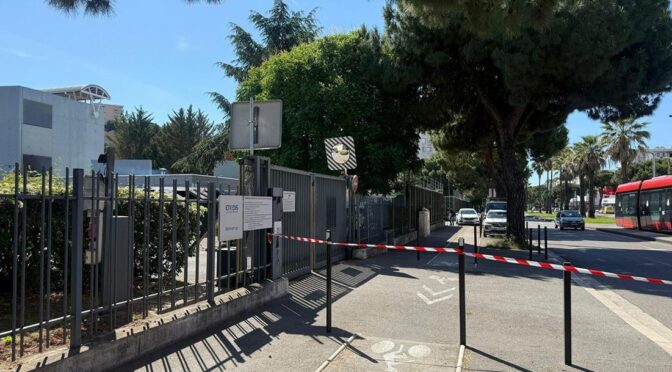
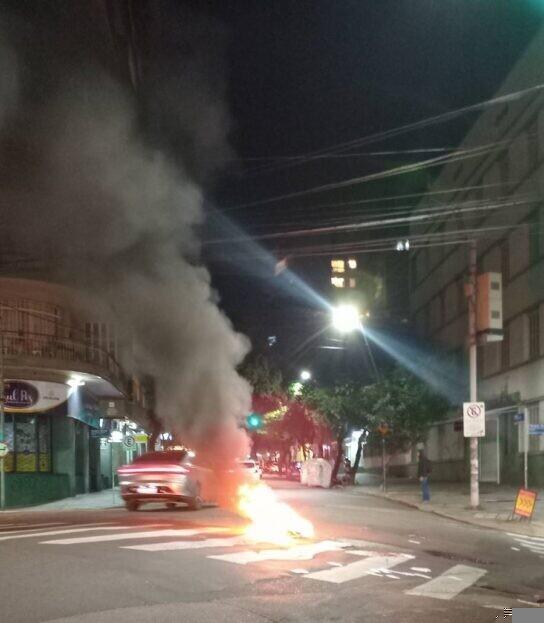
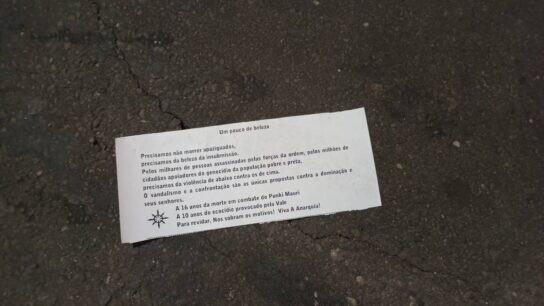


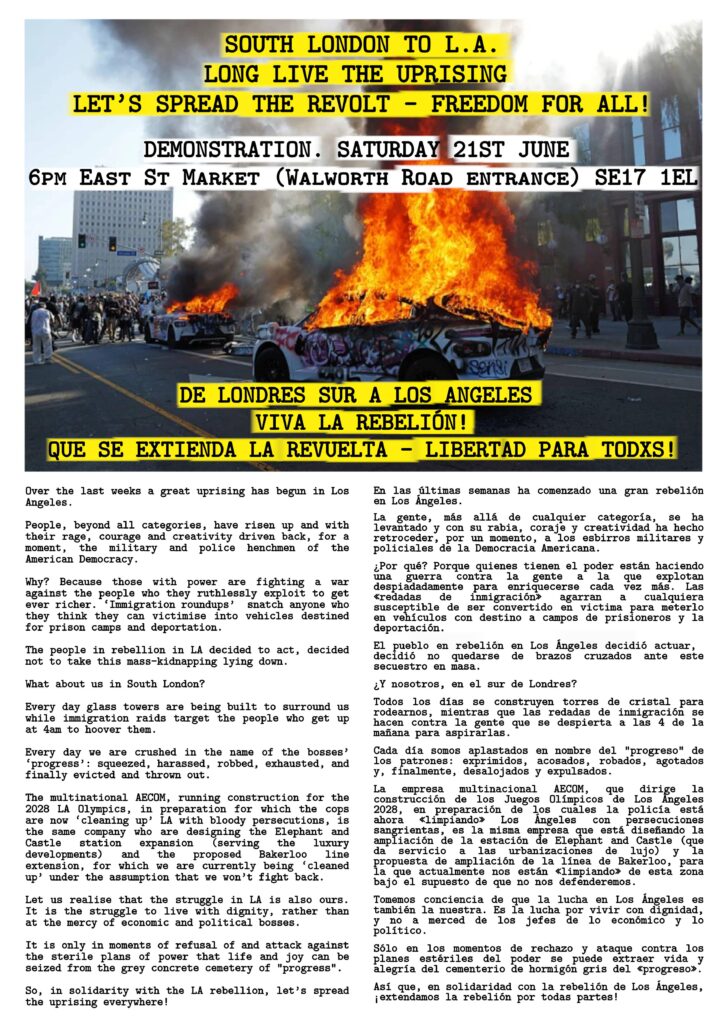

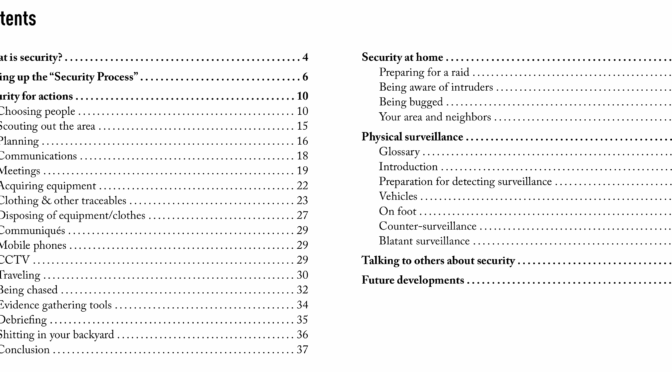
All across the country a combative movement has directly stood up against ICE, DHS and the broader
machinery of deportation and border enforcement. We are not just LA, but we are MPLS, NYC, Phoenix, Atlanta, and many more cities.
As ICE continues to invade, as police continue to protect them and the supposed opposition can only manage nice words we see clearly that “sanctuary” is paper thin and if it’s ever to be it’s up to us to make it. And look how we’ve done it, all over the country putting state security forces on the run. In Newark an uprising in a detention center joined with combative action on the outside enabled 9 people to flee captivity, with 4 still on the run.
Continue reading We Are The Fire That Will Melt ICE (Flier) June 16, 2025 (USA) →